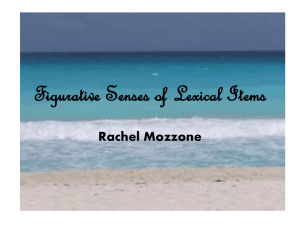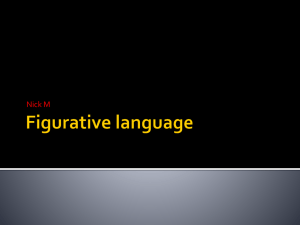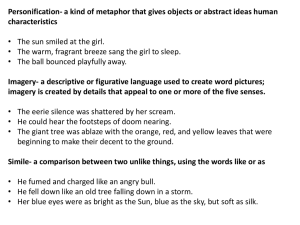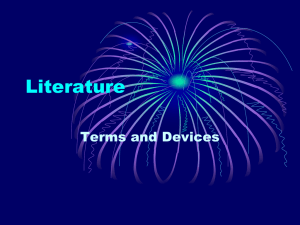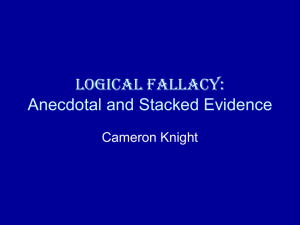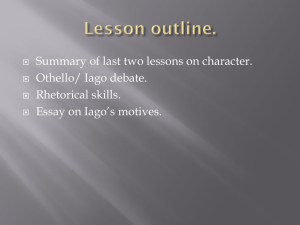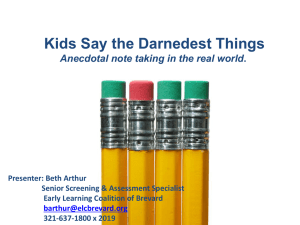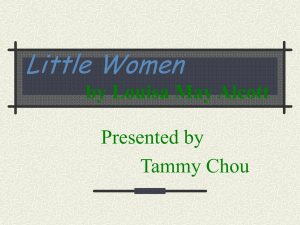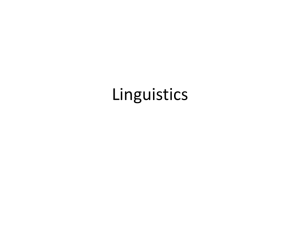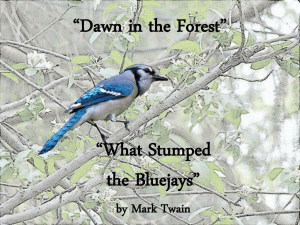types of evidence and sentences
advertisement
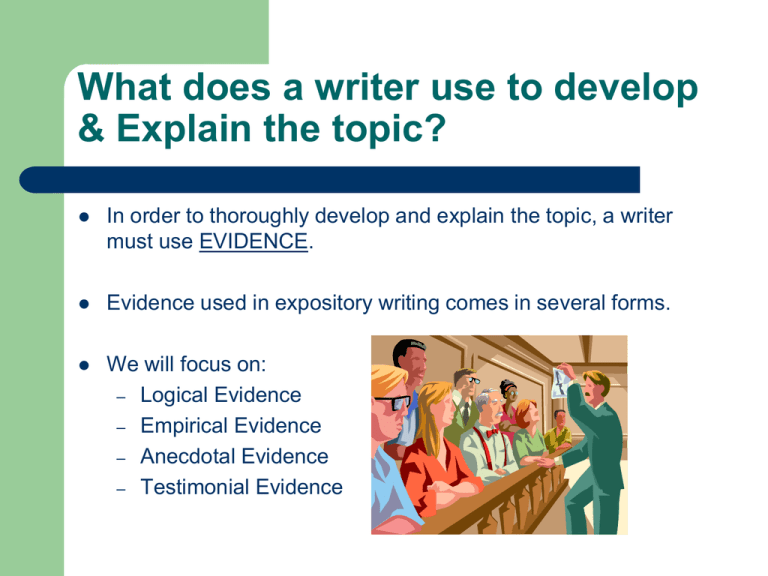
What does a writer use to develop & Explain the topic? In order to thoroughly develop and explain the topic, a writer must use EVIDENCE. Evidence used in expository writing comes in several forms. We will focus on: – Logical Evidence – Empirical Evidence – Anecdotal Evidence – Testimonial Evidence What is logical evidence? Logical evidence, simply put, refers to FACTS. When a writer uses facts to develop an expository essay and to support their thesis statement, the writer is using LOGICAL EVIDENCE. Logical evidence is convincing for the reader/audience because a fact is something that can be verified, something real or actual. Example: “In 2008, 7.3 million people died of heart disease.” What is empirical evidence? Empirical evidence is evidence that can be experienced or observed. Scientific research is considered empirical evidence. Example: “The sun will rise tomorrow.” (We know this to be true because we have seen the sun rise every day.) Example: reading the temperature on a thermometer (It will say the same thing no matter who is looking at it.) What is anecdotal evidence? Anecdotal evidence consists of an anecdote or a descriptive story about an event or experience. Another name for this type of evidence is a testimonial. We are all familiar with this kind of evidence and commonly use it in everyday decision making. For example, when choosing a babysitter or dentist, we would often ask for the experiences of friends and family. Anecdotal evidence falls short of what is necessary for a reasonable standard of proof. Example: “During last week’s lockdown, I heard a student was arrested for smoking in the bathroom.” Testimonial evidence Testimonial evidence is given by an expert or authority in a particular field (a doctor, lawyer, police officer, etc.) Differs from anecdotal evidence in that the evidence is almost always considered to be credible. Example: “Doctors say that eating candy is bad for your health.” Example: “Police say that the robbers were armed and wearing masks.” Figurative Language, Rhetorical Devices, & Syntax Appositive An appositive is a noun or pronoun — often with modifiers — set beside another noun or pronoun to explain or identify it. Here are some examples of appositives (the noun or pronoun will be in blue, the appositive will be in red). -Your friend Bill is in trouble. -My brother's car, a sporty red convertible with bucket seats, is the envy of my friends. -The first state to ratify the U. S. Constitution, Delaware is rich in history. Anaphora a rhetorical term for the repetition of a word or phrase at the beginning of successive clauses or verses. – “It was the best of times, it was the worst of times, it was the age of wisdom, it was the age of foolishness, it was the epoch of belief, it was the epoch of incredulity, it was the season of Light, it was the season of Darkness, it was the spring of hope, it was the winter of despair.” Allusion an expression designed to call something to mind without mentioning it explicitly; an indirect or passing reference. -“We are also Matthew, Mark, Luke, and John.” - “I am no Prince Hamlet.” Figurative Language Metaphor: a figure of speech which compares two things without using “like” or “as” – – Our house is our nest My love is a deep ocean Simile: a figure of speech which compares two things using “like” or “as” – – Our house is LIKE a nest My love is AS deep as an ocean Figurative Language Extended Metaphor: a metaphor that draws the comparison out and compares the two things at length and in many ways – Our home is our nest, we fly away only to return to its snug protection. Personification: figure of speech in which an object, animal or idea is given human characteristics – – Our house wraps our family in its warm embrace. The dog laughed and the bears sang. Onomatopoeia the creation of words that imitate natural sounds – Buzz, murmur, hiss, bang, boom Rhetorical Fragment A rhetorical fragment is an incomplete sentence. It is used to evoke some emotional response from the readers. – – "See, a marriage needs love. And God. And a little money. That's all. The rest you can deal with.” He knew it was not enough. Not enough. Metonymy A figure of speech in which one word or phrase is substituted for another with which it is closely associated. -England decides to keep check on immigration. -The suits were at meeting. -Pen is mightier than sword. -Let me give you a hand. Synecdoche a figure of speech in which a term for a part of something refers to the whole of something, or viceversa. Any example of synecdoche is also an example of metonymy, but only some examples of metonymy are synecdoche. – Part to represent whole: – Whole to represent part: At the Olympics, you will hear that the United States won a gold medal in an event. That actually means a team from the United States, not the country as a whole. Asyndeton v. Polysyndeton Asyndeton the omission of conjunctions “He has provided the poor with jobs, with opportunity, with selfrespect.” “I came, I saw, I conquered.” Polysyndeton a list or series of words, phrases, or clauses that is connected with the repeated use of the same conjunction. “We lived and laughed and loved and left.” “Nor will it be finished in the first one thousand days; nor in the life of this Administration; nor even perhaps in our lifetime on this planet.” Epistrophe repetition of a word or expression at the end of successive phrases, clauses, sentences, or verses especially for rhetorical or poetic effect – – “of the people, by the people, for the people” “When I was a child, I spoke as a child, I understood as a child, I thought as a child.” Figurative Language Hyperbole: figure of speech in which the truth is exaggerated for emphasis – – Our house means more to us than all the money in the world I’m so happy I’m just going to die Loose/Cumulative Sentence Structure • An independent clause followed by a series of subordinate constructions (phrases or clauses) that gather details about a person, place, event, or idea. – I found a large hall, obviously a former garage, dimly lit, and packed with cots. I knew I had found a friend in the woman, who herself was a lonely soul, never having known the love of man or child. – Periodic Sentence A long and frequently involved sentence, marked by suspended syntax, in which the sense is not completed until the final word--usually with an emphatic climax. – – "In the almost incredibly brief time which it took the small but sturdy porter to roll a milk-can across the platform and bump it, with a clang, against other milk-cans similarly treated a moment before, Ashe fell in love.“ "To believe your own thought, to believe that what is true for you in your private heart is true for all men, that is genius." Active v. Passive Voice In an active sentence, the subject is doing the action. – – "Steve loves Amy." (Steve is the subject, and he is doing the action: he loves Amy, the object of the sentence.) “I Heard It through the Grapevine.” ("I" is the subject, the one who is doing the action. "I" is hearing "it," the object of the sentence.) Active v. Passive Voice In passive voice, the target of the action gets promoted to the subject position. – – "Amy is loved by Steve." (The subject of the sentence becomes Amy, but she isn't doing anything. Rather, she is just the recipient of Steve's love. The focus of the sentence has changed from Steve to Amy.) “It was heard by me through the grapevine” (not such a catchy title anymore.) Jargon Colloquialism special words or expressions that are used by a particular profession or group and are difficult for others to understand – Touchdown, territory, scrambling, loose ball, kickoff, man-in-motion, down, end zone, goal line, hand-off, offside, picked off, recovery, audible, blitz, clipping, down. – “on cloud nine,” “sweet tooth,” “poker face,” “back burner” a word or phrase that is not formal or literary, typically one used in ordinary or familiar conversation. “Hallelujah holla back.” –Barack Obama - “Y’all”, “gonna”, “wanna” – Inverted Syntax Sentence structure in which the expected order of words is reversed Sometimes this is found in older poems because authors would reverse word order to conform to meter and rhyme scheme however people did not speak this way in everyday language Inverted Syntax From the flames I ran away I ran away from the flames My words on deaf ears fell My words fell on deaf ears Indifference, then, is not only a sin, it is a punishment. Then, indifference is not only a sin, it is a punishment. Parallel Structure Parallel structure means using the same pattern of words to show that two or more ideas have the same level of importance. -Mary likes to hike, to swim, and to ride a bicycle. -Mary likes to hike, swim, and ride a bicycle. -Mary like hiking, swimming, and riding a bicycle. DO NOT mix forms: – – Mary likes hiking, swimming, and to ride a bicycle. The coach told the players that they should get a lot of sleep, that they should not eat too much, and to do some warm-up exercises before the game. Situational Irony Irony involving a situation in which actions have an effect that is opposite from what was intended. - A man takes a back road to avoid traffic on the highway, and a wreck end up keeping him in stopped traffic for an hour.

